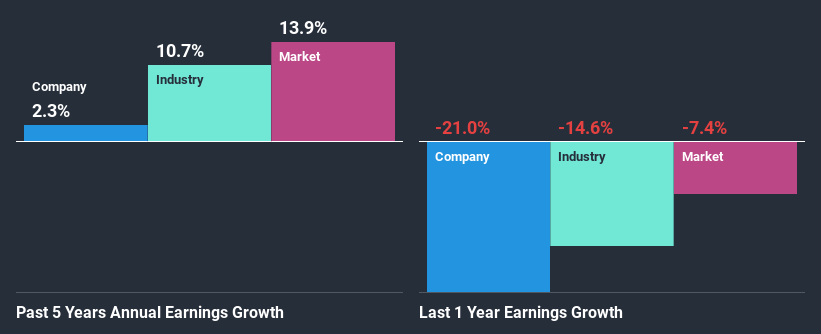Vesuvius India Limited's (NSE:VESUVIUS) Stock is Soaring But Financials Seem Inconsistent: Will The Uptrend Continue?

Vesuvius India (NSE:VESUVIUS) has had a great run on the share market with its stock up by a significant 16% over the last three months. However, we decided to pay attention to the company's fundamentals which don't appear to give a clear sign about the company's financial health. In this article, we decided to focus on Vesuvius India's ROE.
Return on equity or ROE is an important factor to be considered by a shareholder because it tells them how effectively their capital is being reinvested. In other words, it is a profitability ratio which measures the rate of return on the capital provided by the company's shareholders.
See our latest analysis for Vesuvius India
How To Calculate Return On Equity?
Return on equity can be calculated by using the formula:
Return on Equity = Net Profit (from continuing operations) ÷ Shareholders' Equity
So, based on the above formula, the ROE for Vesuvius India is:
8.3% = ₹689m ÷ ₹8.3b (Based on the trailing twelve months to June 2020).
The 'return' refers to a company's earnings over the last year. So, this means that for every ₹1 of its shareholder's investments, the company generates a profit of ₹0.08.
What Is The Relationship Between ROE And Earnings Growth?
We have already established that ROE serves as an efficient profit-generating gauge for a company's future earnings. We now need to evaluate how much profit the company reinvests or "retains" for future growth which then gives us an idea about the growth potential of the company. Generally speaking, other things being equal, firms with a high return on equity and profit retention, have a higher growth rate than firms that don’t share these attributes.
Vesuvius India's Earnings Growth And 8.3% ROE
As you can see, Vesuvius India's ROE looks pretty weak. A comparison with the industry shows that the company's ROE is pretty similar to the average industry ROE of 8.3%. Therefore, the low net income growth of 2.3% seen by Vesuvius India over the past five years could probably be the result of it having a lower ROE.
We then compared Vesuvius India's net income growth with the industry and found that the company's growth figure is lower than the average industry growth rate of 11% in the same period, which is a bit concerning.

The basis for attaching value to a company is, to a great extent, tied to its earnings growth. The investor should try to establish if the expected growth or decline in earnings, whichever the case may be, is priced in. Doing so will help them establish if the stock's future looks promising or ominous. If you're wondering about Vesuvius India's's valuation, check out this gauge of its price-to-earnings ratio, as compared to its industry.
Is Vesuvius India Using Its Retained Earnings Effectively?
Vesuvius India's low three-year median payout ratio of 16% (or a retention ratio of 84%) should mean that the company is retaining most of its earnings to fuel its growth. However, the low earnings growth number doesn't reflect this as high growth usually follows high profit retention. So there could be some other explanation in that regard. For instance, the company's business may be deteriorating.
In addition, Vesuvius India has been paying dividends over a period of at least ten years suggesting that keeping up dividend payments is way more important to the management even if it comes at the cost of business growth.
Conclusion
In total, we're a bit ambivalent about Vesuvius India's performance. While the company does have a high rate of profit retention, its low rate of return is probably hampering its earnings growth.
When trading Vesuvius India or any other investment, use the platform considered by many to be the Professional's Gateway to the Worlds Market, Interactive Brokers. You get the lowest-cost* trading on stocks, options, futures, forex, bonds and funds worldwide from a single integrated account. Promoted
New: Manage All Your Stock Portfolios in One Place
We've created the ultimate portfolio companion for stock investors, and it's free.
• Connect an unlimited number of Portfolios and see your total in one currency
• Be alerted to new Warning Signs or Risks via email or mobile
• Track the Fair Value of your stocks
This article by Simply Wall St is general in nature. It does not constitute a recommendation to buy or sell any stock, and does not take account of your objectives, or your financial situation. We aim to bring you long-term focused analysis driven by fundamental data. Note that our analysis may not factor in the latest price-sensitive company announcements or qualitative material. Simply Wall St has no position in any stocks mentioned.
*Interactive Brokers Rated Lowest Cost Broker by StockBrokers.com Annual Online Review 2020
Have feedback on this article? Concerned about the content? Get in touch with us directly. Alternatively, email editorial-team@simplywallst.com.
About NSEI:VESUVIUS
Outstanding track record with excellent balance sheet and pays a dividend.
Similar Companies
Market Insights
Community Narratives



